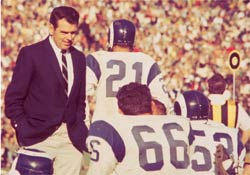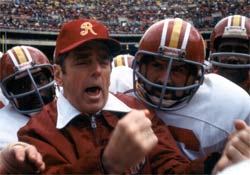|
What was not to be found with an Allen-coached team was an exciting offense. His ball-control attack, led by quarterback Roman Gabriel, put a premium on avoiding mistakes. His offense usually scored enough to win, but it seldom got the fans up and cheering. It was Allen's unexciting offense as much as his trading away draft choices that caused owner Dan Reeves to shock everyone by firing him after the '68 season. The Rams had just completed a commendable 10-3-1 season while overcoming a crippling spate of injuries. Reeves explained, "winning with Allen wasn't fun."
 The firing nearly precipitated a rebellion among the Rams players who, almost to a man, went to bat for their coach. Eventually, Reeves called a press conference to introduce the Rams new coach - George Allen. The firing nearly precipitated a rebellion among the Rams players who, almost to a man, went to bat for their coach. Eventually, Reeves called a press conference to introduce the Rams new coach - George Allen.
The reprieve was temporary. Allen's team went 20-7-1 over the next two years and won another division title in '68, but a second-place finish in 1970 finished Allen. In five years, he'd made 51 trades, including most of the Rams early-round draft choices. Moreover, the payroll for his collection of graybeards was still climbing. And, the offense still made caffeine yawn.
The Washington Redskins, who'd enjoyed only four winning seasons since 1945, were more than willing to be bored by a few wins. They hired Allen as coach and general manager. He inherited a 6-8-0 team on its way down. In a dazzling series of trades, he brought in Billy Kilmer, Roy Jefferson, Boyd Dowler, Ron McDole, Clifton McNeil, Verlon Biggs, Diron Talbert, Jack Pardee, Myron Pottios, John Wilber, Richie Petitbon, and Speedy Duncan. The press tabbed them "The Over-the-Hill Gang" after a popular movie title, but the veterans made few mistakes. When the offense bogged down from injuries, the defense was able to keep the team winning. The 9-4-1 record represented Washington's most victories in 29 years. Despite his usual early exit from the playoffs, Allen was named either NFL or NFC Coach of the Year by all the selecting boards.
 The next year was even better. The 'Skins edged Dallas for their first division title since World War II. Larry Brown led the NFC in rushing and Kilmer, though never stylish, was an effective passer. But, as usual with an Allen team, the defense filled with creaking veterans was the strength. The next year was even better. The 'Skins edged Dallas for their first division title since World War II. Larry Brown led the NFC in rushing and Kilmer, though never stylish, was an effective passer. But, as usual with an Allen team, the defense filled with creaking veterans was the strength.
Washington opened the playoffs with a victory - Allen's first in post-season - topping Green Bay 16-3. Then they defeated the Cowboys 26-3 for the NFC title. Next stop, Los Angeles Memorial Coliseum and Super Bowl VII.
Unfortunately, the 'Skins ran straight into Fate or Kismet or maybe just plain Momentum. Their opponents, the Miami Dolphins were undefeated, untied, and unfazed by Super Bowl hoopla, having been there the year before. Allen's defense held the Dolphins to 14 points and even scored a touchdown on Mike Bass' 49-yard return of Garo Yepremian's fumble. Allen's offense contributed no points as Miami won 14-7.
From 1973 through 1977, his teams had winning records and made the playoffs three times, but some questioned the price. His veteran roster cost more than other teams, and he continued to be criticized for sacrificing the Redskins' future by trading away draft choices. In all his time in Washington, the 'Skins had one draft pick before the fifth round.
The Future-Is-Now Coach defended his strategy: "A gambler is a coach who uses a number one draft choice on an untested, inexperienced lineman or receiver from Illinois Normal. A conservative is a man who trades his number one choices for established veterans…. In my opinion, the odds are against gamblers, innovators and pacesetters in football. Call me a conservative."
Redskins president Edward Bennett Williams joked: "His father gave him a six-week-old puppy when he was four, and he traded it away for two 12-year-old cats."
Allen left the Redskins following the '77 season, and after a brief return to the Rams for two preseason games in 1978, he stayed out of football for five years.
In 1983, he became head coach of the Chicago Blitz of the United States Football League and took them to a strong 12-6-0 record. The next year, the Blitz and Arizona franchises were exchanged. Allen's Arizona Wranglers went all the way to the league championship game before losing to the Philadelphia Stars. When he resigned, it seemed the final chapter in his coaching career.
Although he'd never quite won it all, he was always in the running. If he had no Super Bowl ring, only Vince Lombardi of the coaches in the Pro Football Hall of Fame had a higher career winning percentage. He'd given his sport enough inspirational phrases to batter through a whole season of locker room doors. But mostly, he'd convinced his players that they were better than they ever thought they'd be.
Deacon Jones said, "He was the greatest coach I ever played for. He believed in discipline and conditioning. Totally dedicated. He would work 24 hours a day at that film projector, and he would come up with something against anybody." But Jones credited Allen with more than that. He had been a Ram for six years when Allen arrived, and he was acutely aware of the racial strife of the 1960s. "I did not like white people," he says. "I was dealing with segregation and tokenism. Then I met Coach Allen. He brought about the only level-playing field I ever had and all the things I was really upset about in my life switched just like that."
Allen had said, "Each of us has been put on this earth with the ability to do something well. We cheat ourselves and the world if we don't use that ability as best we can." The man who needed to coach returned to the sideline in 1990 at Long Beach State.
Etty Allen, his wife, later said, "I realized when he went to Long Beach State that I finally understood him. The level of competition is not what matters; it's the competition itself."
It was his final season. Allen died on the last day of the year. Most football fans learned of his passing while watching New Year's Day Bowl Games. Somehow, that seemed fitting.
|
 The firing nearly precipitated a rebellion among the Rams players who, almost to a man, went to bat for their coach. Eventually, Reeves called a press conference to introduce the Rams new coach - George Allen.
The firing nearly precipitated a rebellion among the Rams players who, almost to a man, went to bat for their coach. Eventually, Reeves called a press conference to introduce the Rams new coach - George Allen. The next year was even better. The 'Skins edged Dallas for their first division title since World War II. Larry Brown led the NFC in rushing and Kilmer, though never stylish, was an effective passer. But, as usual with an Allen team, the defense filled with creaking veterans was the strength.
The next year was even better. The 'Skins edged Dallas for their first division title since World War II. Larry Brown led the NFC in rushing and Kilmer, though never stylish, was an effective passer. But, as usual with an Allen team, the defense filled with creaking veterans was the strength.